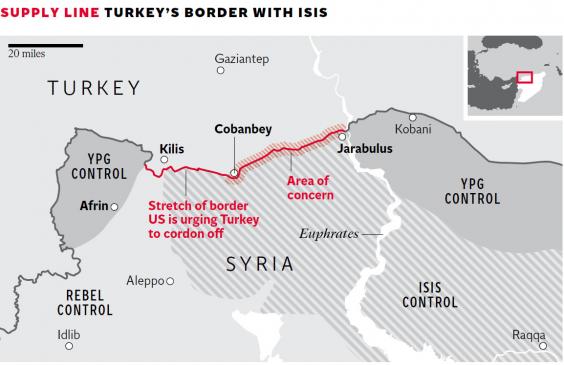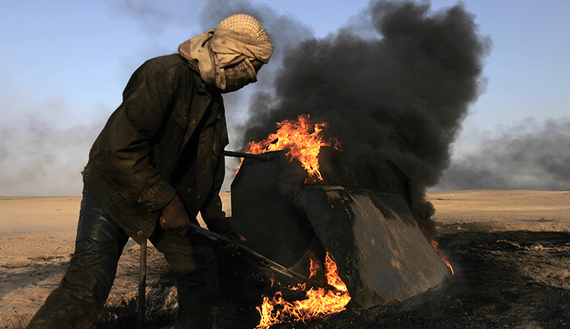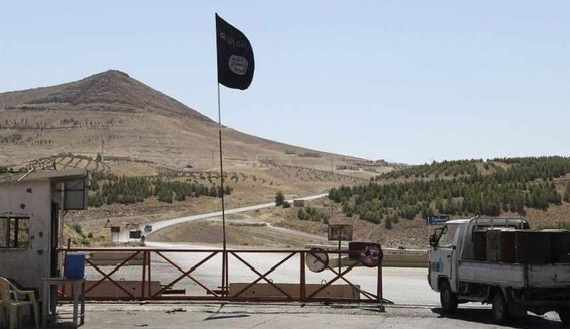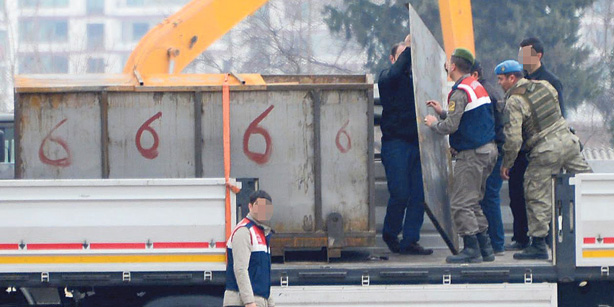The Turkish airforce shot down a Russian Su-24M last week, and since that time, critical examination of Turkey has brought a number of issues that people had been warned about before to light in the media, which until now had been mostly ignored.
I had intended to write an article at Majorityrights about this, but then I realised that the Independent was actually saying everything that I was going to write, so in the interest of saving time, I will just quote them verbatim:
The Independent, ‘War with Isis: Obama demands Turkey closes stretch of border with Syria’, 01 Dec 2015 (emphasis added):
The US is demanding that Turkey close a 60-mile stretch of its border with Syria which is the sole remaining crossing point for Isis militants, including some of those involved in the massacre in Paris and other terrorist plots.
The complete closure of the 550-mile-long border would be a serious blow to Isis, which has brought tens of thousands of Islamist volunteers across the frontier over the past three years.
In the wake of the Isis attacks in Paris, Washington is making clear to Ankara that it will no longer accept Turkish claims that it is unable to cordon off the remaining short section of the border still used by Isis. “The game has changed. Enough is enough. The border needs to be sealed,” a senior official in President Barack Obama’s administration told The Wall Street Journal, describing the tough message that Washington has sent to the Turkish government. “This is an international threat, and it’s coming out of Syria and it’s coming through Turkish territory.”
The US estimates some 30,000 Turkish troops would be needed to close the border between Jarabulus on the Euphrates and the town of Kilis, further west in Turkey, according to the paper. US intelligence agencies say that the stretch of frontier most commonly used by Isis is between Jarabulus, where the official border crossing has been closed, and the town of Cobanbey.
It has become of crucial importance ever since the Syrian Kurdish forces known as the People’s Protection Units (YPG) captured the border crossing at Tal Abyad, 60 miles north of Isis’s capital of Raqqa in June. Turkey had kept that border crossing open while Isis was in control on the southern side, but immediately closed it when the YPG seized the crossing point. The Turkish authorities are refusing to allow even the bodies of YPG fighters, who are Turkish citizens and were killed fighting Isis, to be taken back across the border into Turkey.
The US move follows increasing international criticism of Turkey for what is seen as its long-term tolerance of, and possible complicity with, Isis and other extreme jihadi groups such as al-Qaeda’s branch in Syria, Jabhat al-Nusra Front, and Ahrar al-Sham. Not only have thousands of foreign fighters passed through Turkey on their way to join Isis, but crude oil from oilfields seized by Isis in north-east Syria has been transported to Turkey for sale, providing much of revenue of the self-declared Islamic State.
Last week a Turkish court jailed two prominent journalists for publishing pictures of a Turkish truck delivering ammunition to opposition fighters in Syria. President Recep Tayyip Erdogan claimed that the weapons were destined for Turkmen paramilitaries allied to Turkey fighting in Syria, but this was denied by Turkish political leaders close to the Turkmen.

Turkey is now under heavy pressure from the US and Russia, with President Vladimir Putin directly accusing Ankara of aiding Isis and al-Qaeda. In the wake of the shooting down of a Russian aircraft by a Turkish jet, Russia is launching heavy air strikes in support of the Syrian army’s advance to control the western end of the Syrian Turkish border. The pro-opposition Syrian Observatory for Human Rights said a Russian air strike on the town of Ariha yesterday killed 18 people and wounded dozens more. Meanwhile Turkey said it had now received the body of the pilot killed when the plane was shot down and would repatriate it to Moscow.
The US demand that Turkey finally close the border west of Jarabulus could, if Turkey complies, prove more damaging to Isis than increased air strikes by the US, France and, possibly Britain. The YPG has closed half the Syrian frontier over the last year and defeated an Isis assault aimed at taking another border crossing at Kobani. Syrian Kurdish leaders say they want to advance further west from their front line on the Euphrates and link up with a Kurdish enclave at Afrin. But Turkey insists that it will resist a further YPG advance with military force. Instead, it had proposed a protected zone on the southern side of the border from which Isis would be driven by moderate Syrian opposition fighters.
The US has opposed this proposal, suspecting that the Turkish definition of moderates includes those the US is targeting as terrorists. It also appears to be a ploy to stop the YPG, heavily supported by US air power, expanding its de facto state along Turkey’s southern flank. US officials are quoted as saying that there could be “significant blowback” against Turkey by European states if it allows Isis militants to cross from Syria into Turkey and then carry out terrorist outrages in Europe.
Meanwhile in Iraq, officials said three more mass graves had been found in the northern town of Sinjar, which Kurdish forces backed by US-led air strikes recaptured from Isis earlier this month.
This is relevant to two flashbacks from last year, to stories that were made available in Al-Monitor via Taraf:
Al-Monitor / Taraf, ‘Opposition MP says ISIS is selling oil in Turkey’, 13 Jun 2014:

A man works at a makeshift oil refinery site in Raqqa’s countryside, May 5, 2013. (photo by REUTERS/Hamid Khatib)
The Islamic State of Iraq and al-Sham (ISIS) has been selling smuggled Syrian oil in Turkey worth $800 million, according to Ali Ediboglu, a lawmaker for the border province of Hatay from the main opposition Republican People’s Party (CHP).
Speaking to Taraf, Ediboglu recounted the findings of his research on ISIS activities.
“ISIS is a terrorist organization that poses a global threat, a group that kills recklessly and believes that killing people is a ticket to heaven,” Ediboglu said. “One would expect such a group to engage in certain attacks in Turkey any time. Turkey’s cooperation with thousands of men of such a mentality is extremely dangerous. You can never know what demands they could make to Turkey, a country whose regime they consider to be un-Islamic. No one can guarantee they will not repeat the massacres they commit in Iraq today or carry out similar attacks in Turkey tomorrow.”
Oil revenues
Ediboglu said: “$800 million worth of oil that ISIS obtained from regions it occupied this year [the Rumeilan oil fields in northern Syria — and most recently Mosul] is being sold in Turkey. They have laid pipes from villages near the Turkish border at Hatay. Similar pipes exist also at [the Turkish border regions of] Kilis, Urfa and Gaziantep. They transfer the oil to Turkey and parlay it into cash. They take the oil from the refineries at zero cost. Using primitive means, they refine the oil in areas close to the Turkish border and then sell it via Turkey. This is worth $800 million.”
Is Turkish intelligence helping fighters?
Ediboglu further stated: “Fighters from Europe, Russia, Asian countries and Chechnya are going in large numbers both to Syria and Iraq, crossing from Turkish territory. There is information that at least 1,000 Turkish nationals are helping those foreign fighters sneak into Syria and Iraq to join ISIS. The National Intelligence Organization (MIT) is allegedly involved. None of this can be happening without MIT’s knowledge.”
Taraf’s earlier report on diesel smuggling
Last Aug. 20, Taraf carried a report headlined “Smugglers riding on a billion dollars.” It reported that Turkish soldiers clashed with and repelled hundreds of horse riders and thousands of foot smugglers at the Syrian border on a daily basis. It pointed out that the biggest fight between the [Syrian Kurdish] People’s Protection Units (YPG) and the al-Qaeda-linked Jabhat al-Nusra in Rojava [northern Syria] was over the revenues from the sale of the region’s petroleum products to Turkey.
The report noted that some 2,000 oil wells exist in the Rumeilan region, which lies on the other side of the border stretching between [Turkey’s] districts of Cizre in Sirnak province and Nusaybin in Mardin province. “The region’s oil is being smuggled to Turkey. The daily amount of smuggled diesel fuel has reached 1,500 tons, which corresponds to 3.5% of Turkey’s consumption,” it added.
And:
Al-Monitor / Taraf, ‘Al-Qaeda Militants Travel To Syria Via Turkey’, 28 Jul 2014:

A vehicle carrying supplies stands at a checkpoint of the Islamist rebel group Jabhat al-Nusra in Syria’s Deir al-Zour countryside, July 27, 2013. (photo by REUTERS/Karam Jamal)
During the 2½ years of clashes in Syria, there has been constant debate about how Turkey’s borders were crossed. There were reports that Islamic groups going to fight regime of President Bashar al-Assad — first and foremost al-Qaeda, which has supporters in Turkey — were crossing over the Turkish border.
Interesting claims
To find out more, we met with people close to al-Qaeda in Istanbul. These people are shopkeepers who live in the Fatih district of Istanbul, but who won’t give their names. They have interesting things to say about the Syrian war. These sources told us that following the eruption of war in Syria, al-Qaeda elements from Europe, the Caucasus, Afghanistan and North Africa began crossing into Syria via Turkey. These sources also had interesting things to say about the clashes with the Kurdish PYD and how the border is crossed.
Met by intelligence officials
O.E., one of our sources, said he crossed the border and went to Syria before the Jabhat al-Nusra-PYD clashes. He crossed from an unsupervised area on the Turkish side to the Syrian side controlled by the PYD. O.E. said, “We told the PYD we were there for Jabhat al-Nusra and they let us pass.” O.E. said many people cross the same way: “Fighters coming via Chechnya and Afghanistan are met at the Syrian border. There are intelligence officials there. Those crossing the border inform the intelligence people of their affiliation and under whose command they will be. Then, they cross the border and report to their units.”
Treated in Turkey
O.E. said those heavily wounded in clashes are brought to Turkish hospitals. He added, “Some return to their countries by the same route. There are al-Qaeda mujahedeen from Afghanistan and the Caucasus fronts who come with their families. Most of them settle in Syria. There are hundreds of militants who come the same way from Northern Africa, the Caucasus, Europe and Afghanistan. They simply cross the Turkish border and join the fight.”
1,000 Chechens to Syria
O.E. said Chechens are now one of the strongest groups in Syria. “Under their commander Abu Omar, about 1,000 Chechens came to Syria. First they were with Jabhat al-Nusra, but now they have moved over to the Islamic State of Iraq and Syria (ISIS),” he said.
There are also Turks
O.E. said many Turks had gone to Syria to fight. “Some were martyred. Some stayed for a while and returned. Some couldn’t resist going back to Syria. A retired policeman who is a friend of mine went to Syria to fight. He trained fighters in weapons. Several of us went to Syria before the fighting between the PYD and Jabhat al-Nusra broke out. Without being asked anything on the Turkish side, we just crossed to an area of Syria controlled by the PYD. We told them we came to [fight with] Jabhat al-Nusra and they let us enter,” O.E. said.
The ISIS fans the clashes
O.E. claimed that it was the ISIS that was flaming the clashes with the PYD. “The ISIS declared that Jabhat al-Nusra was its subordinate organization. Jabhat al-Nusra commanders refused this claim and said they were under al-Qaeda leader Ayman al-Zawahri. These claims caused disputes within the organization. Chechen groups under Abu Omar in Syria split from Jabhat al-Nusra and joined the ranks of the ISIS. It was the ISIS fighters who provoked the recent clashes with the PYD. Reports said the ISIS entered and opened fire in PYD-controlled villages to disrupt the non-hostility agreement between the PYD and Jabhat al-Nusra,” he concluded.
And more recently:
Todays Zaman, ‘Erdogan tacitly acknowledges claim MIT transported arms to Syria’, 25 Nov 2015:

Syria-bound trucks operated by MIT were searched in January 2014 after prosecutors received tip-offs that they were illegally carrying arms to Syria. (Photo: DHA)
President Recep Tayyip Erdogan on Tuesday seemingly validated claims previously made by critics who alleged that the Turkish government was sending weapon-filled trucks to radical groups in Syria by sarcastically asking, “So what if the MIT [National Intelligence Organization] trucks were filled with weapons?”
Pro-government figures had previously claimed that trucks belonging to MIT that were intercepted en-route to Syria contained “humanitarian aid” for the Bayir-Bucak Turkmens who live just over the border from Turkey’s southern Hatay province. Many claims were made by the opposition and Turkish media that the trucks were, in fact, transporting weapons to radical factions in Syria.
Early in 2014, an anonymous tip led to the interception of a number of trucks on the suspicion of weapons smuggling. The first operation took place in Hatay on Jan. 1, 2014. Another anonymous tip led to three more trucks being stopped and searched in Turkey’s southern Adana province on Jan. 19, 2014.
Speaking to a room full of teachers on Tuesday gathered for Teachers’ Day, Erdogan said, “You know of the treason regarding the MIT trucks, don’t you? So what if there were weapons in them? I believe that our people will not forgive those who sabotaged this support.”
Erdogan was speaking just hours after Turkey shot down a Russian Su-24 aircraft near the Syrian border on Tuesday morning after, Ankara has said, it violated Turkish airspace despite repeated warnings.
Erdogan accused the prosecutors investigating the MIT trucks of denying Turkmens the power to defend themselves. “Those [MIT] trucks were taking aid to the Bayir-Bucak Turkmens. Some were saying, ‘Prime Minister Erdogan said, there were no weapons inside those trucks;’ So what if there were?”
Justice and Development Party (AK Party) officials called the 2014 investigation of the MIT trucks “treason and espionage” on the part of the prosecutors because the trucks were claimed to be transporting humanitarian aid to the Bayir-Bucak Turkmens.
Erdogan, who was prime minister at the time, said during a television program immediately after the interception of the trucks became public knowledge that the trucks were carrying aid supplies to Turkmens in Syria.
Many high-level Turkish officials, including then-President Abdullah Gül, said the trucks’ cargo was a “state secret,” which led some to speculate that the trucks were carrying arms.
However, Syrian-Turkmen Assembly Vice Chairman Hussein al-Abdullah said in January 2014 that no trucks carrying aid had arrived from Turkey.
The recent military operation of the Syrian government, backed by Russian air strikes, in the rural area of Latakia, inhabited by Bayir-Bucak Turkmens has caused thousands of Turkmens to flee to the Turkish border. A Turkmen brigade commander called for Turkey’s assistance and expressed his frustration that Turkey’s helping hand had not been extended far enough.
Turkmen Commander Ömer Abdullah of the Sultan Abdülhamit Brigade, who is fighting against the forces of Syrian President Bashar al- Assad, recently called on Turkey to help the Turkmens being pounded with cluster bombs by the Syrian regime and Russian forces.
“We are trying to survive under unbearable brutality and we need Turkey’s help,” said Abdullah. Expressing criticism of the AK Party, Abdullah said: “Every day our Turkmen brothers are dying. We expect the government to support us. Why have they abandoned us? Our martyrs fall every day. Why are we being left alone? I don’t understand.”
Abdullah’s claim pokes an important hole in the AK Party’s claims, while also posing the question of to whom the MIT trucks, now widely accepted as transporting weapons, were sent.
CHP leader says they told AK Party not to send weapons to Syria
Main opposition Republican People’s Party (CHP) leader Kemal Kiliçdaroglu said on Wednesday that Turkey had become a country importing terrorism from Syria.
“We told them [the AK Party] not to. They said they were sending humanitarian aid. Later the documents were revealed [refuting these claims].”
Kiliçdaroglu was referring to the Cumhuriyet daily’s headline story in May which discredited AK Party and Erdogan’s earlier claims that the trucks were carrying humanitarian aid to Turkmens. The article showed photos from the search of the MIT trucks which were revealed to be carrying heavy munitions. Kiliçdaroglu consequently asked to whom the trucks were going, if not to Turkmens.
After the publication of the stills as well as video, Erdogan lashed out at Cumhuriyet and its editor-in-chief, Can Dündar, for publishing the evidence, publicly vowing that Dündar would “pay a heavy price” for his report.
According to the report, there were six steel containers in the trucks which contained a total of 1,000 artillery shells, 50,000 machine gun rounds, 30,000 heavy machine gun rounds and 1,000 mortar shells. All of this is registered in the prosecutor’s file on the MIT truck case, the report said.
Erdogan personally sued Dündar and is requesting that he be given a life sentence, an aggravated life sentence and an additional 42-year term of imprisonment on charges related to a variety of crimes, ranging from espionage to attempting to topple the government and exposing secret information.
Following the Cumhuriyet report, Prime Minister Ahmet Davutoglu said that it is “none of anybody’s business” what the trucks contained. Speaking in a live broadcast on the Habertürk news station, in May, Davutoglu said, “This is a blatant act of espionage.”
Tugrul Türkes, who made it into the AK Party cabinet on Tuesday after switching from the Nationalist Movement Party (MHP) in September, said in June that the trucks were not destined for Syrian Turkmens. Speaking on CNN Türk in June, Türkes said: “I swear that those weapons were not sent to Turkmens as they [Erdogan and other government officials] claim. We [the MHP] have connections with Turkmens [in Syria].”
Prosecutor admits 2,000 truckloads sent to Syria
A pro-government prosecutor who was appointed to the MIT trucks case inadvertently admitted in May that weapon-laden trucks made 2,000 trips to Syria, according to the lawyer of one of the defendants in the case.
Hasan Tok, the lawyer for former Adana Provincial Gendarmerie Regiment Commander Col. Özkan Çokay, who was involved in the search of MIT trucks in January 2014, said that he learned that there had been at least 2,000 trips made by MIT trucks to Syria from the prosecutor, Ali Dogan.
Dogan, known as a government loyalist, filed for a verdict of non-prosecution regarding the investigation after he was appointed to the position of Adana chief public prosecutor. According to Tok, Dogan had asked the defendants in a previous hearing, “2,000 trucks have passed [into Syria], why was this one specially chosen?”
“We didn’t know 2,000 trucks had passed into Syria; may god bless Ali Dogan,” said Tok.
Of course, the weapons did not go to the Turkmens. The weapons on those trucks actually went to groups like the FSA 10th Coastal Brigade which has conducted operations in line with Jahbat Al-Nusra and Ahrar Al-Sham. It’s also reasonable to speculate that significant amounts of those supplies also found their way into the hands of ISIL.
Turkey’s intense protectiveness about Russian interactions with their border, may have been due to the fact that they didn’t want the Russians to be able to do air interdiction against what was an ongoing logistics operation taking place across that border.
It’s a depressingly ridiculous sequence of events which gives Russia the ability to create a media narrative about how ‘only Russia’ is ‘fighting the terrorists’ with real determination, because Turkey is a part of NATO and is basically embarrassing NATO with its duplicitous behaviour.
There is a silver lining to these dark clouds, though. Up until just recently, Russia had been seeking to work with Turkey on the provision of oil and gas pipeline projects into Europe, which would have increased European dependence on Russian energy companies. Thanks to this sequence of events, Russia and Turkey are now at odds with each other, and Russia is seeking to suspend those projects and to place sanctions on Turkey.
All of this has not worked out too badly. Not only has Turkey’s duplicity finally come to light in a way that makes it impossible for anyone in western governments to avoid dealing with it, but additionally the Russian government is now politically incapable of partnering with Turkey against the European Union’s geostrategic interests with regards to energy concerns, at least in the near term, as negotiations on the Turkish Stream pipeline project are suspended.
This gives more time for the effects of the Iran deal to come into play, since Iran was able to enlist Russian assistance in the P5 negotiations to make the case for sanctions being removed, while at the same time positioning itself against Russia as an alternative energy supplier for Europe, which would be able to substitute its natural gas in place of Russia’s and increase the diversification of supply. This would in turn lessen Russia’s political influence in Europe.
Iran’s infrastructure would not be ready to supply Europe in the near term, and so the near term quarrel between Russia and Turkey, gives the European Union more time to coordinate that infrastructure development with Iran, and potentially tilts the tables by making Russia appear less reliable as a supplier.
From that perspective, all of this is a win for the North Atlantic.
Kumiko Oumae works in the defence and security sector in the UK. Her opinions here are entirely her own.

Posted by Damn, I Wish I Was Your Lover on Fri, 04 Dec 2015 16:22 | #
Sophie B. Hawkins, “Damn, I Wish I Was Your Lover”